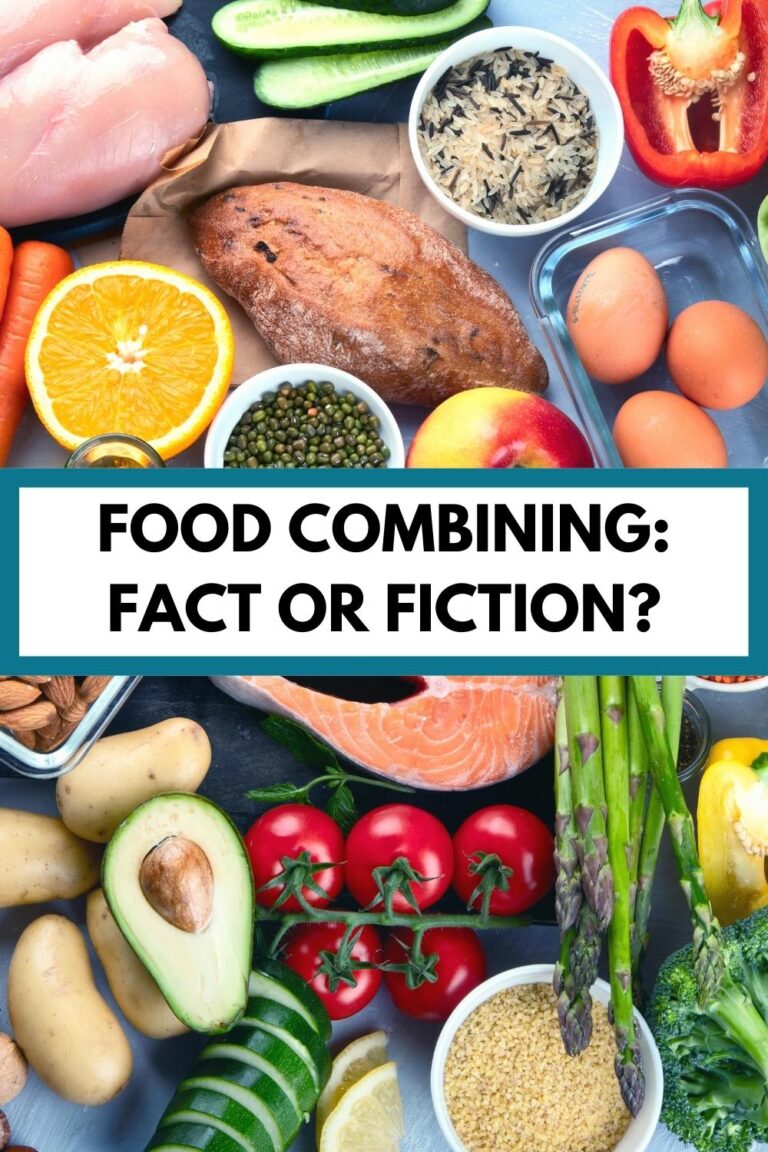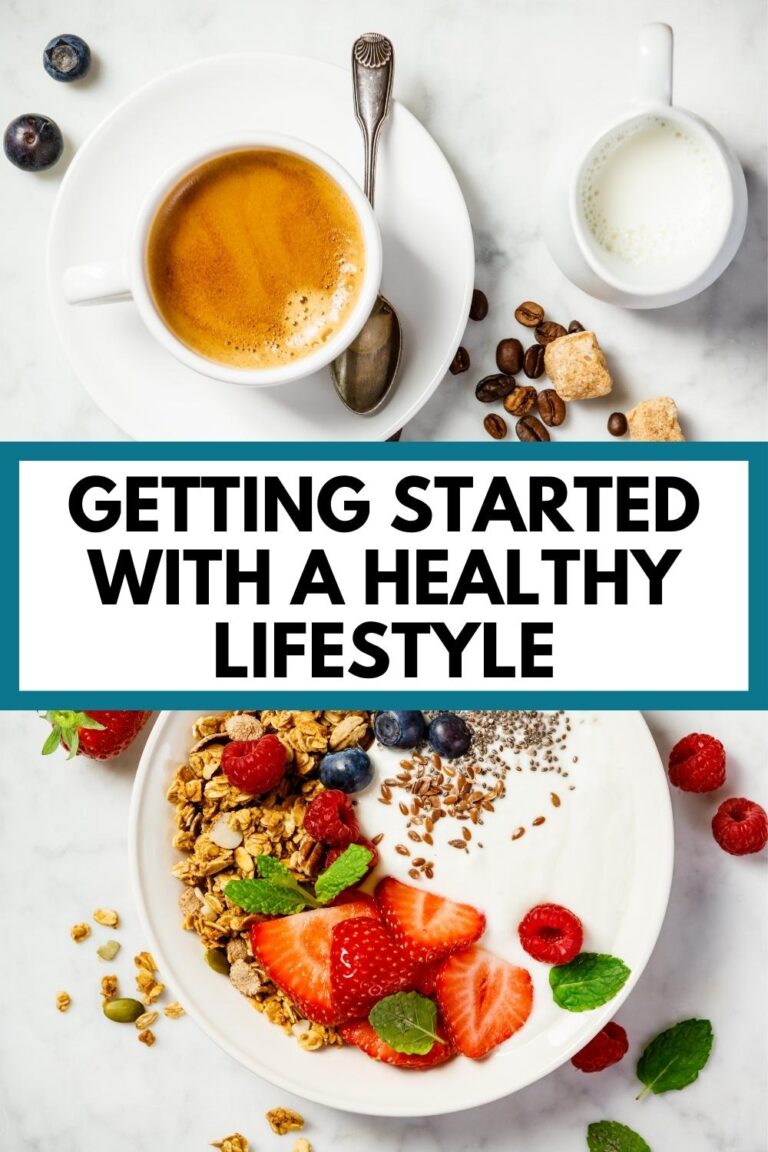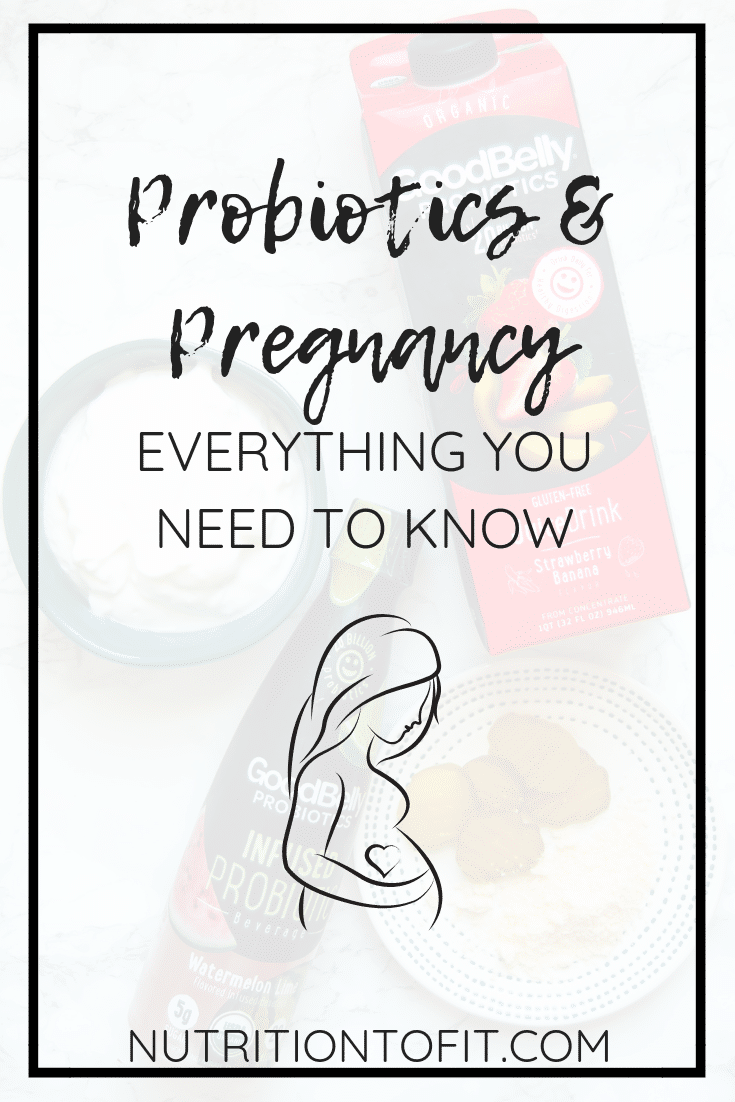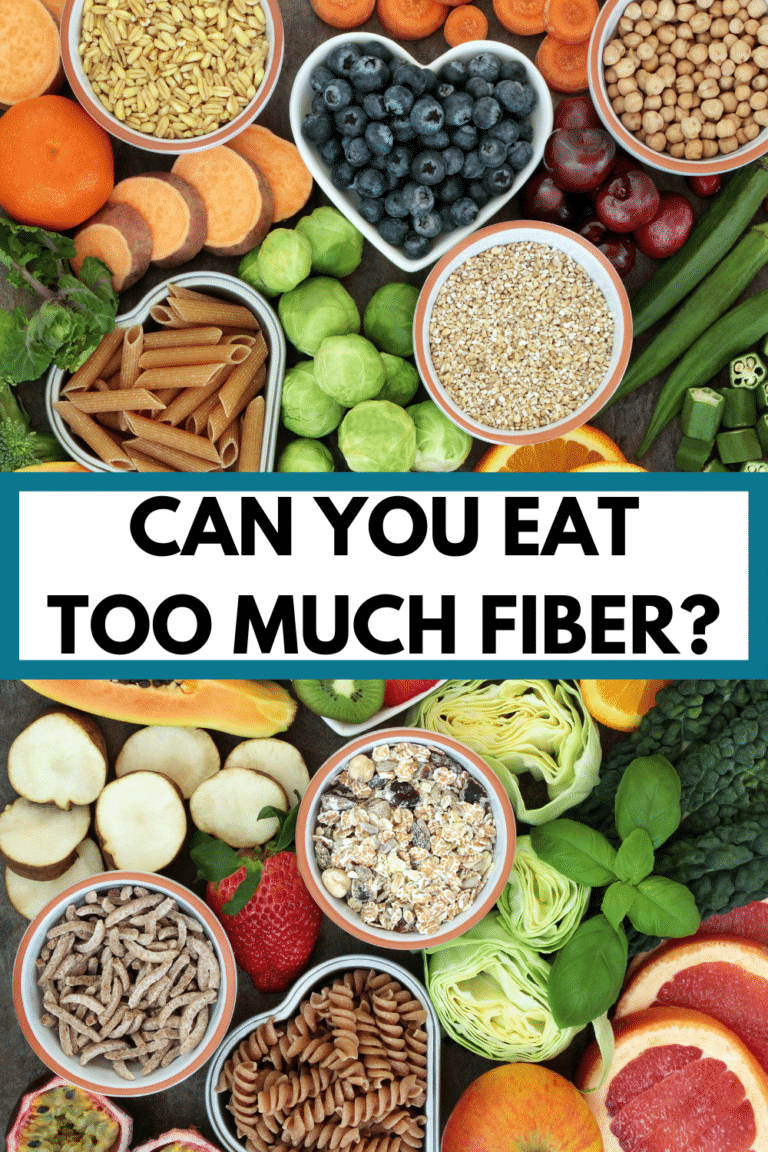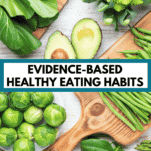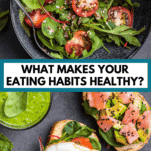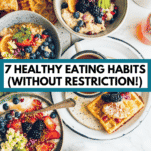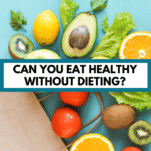7 Healthy Eating Habits (Without Restriction)
Ultimately your eating habits are yours and yours alone, but if you’re looking for some healthy eating habit inspiration, this list of 7 healthy eating habits is for you!
As a registered dietitian, I’ve written this list with evidence-based nutrition in mind. I also always promote a balance with food that leaves you feeling good without restriction. Why? Because if something feels restrictive, you’re going to be hard-pressed for it to become a sustainable habit, and we are not about that life here!
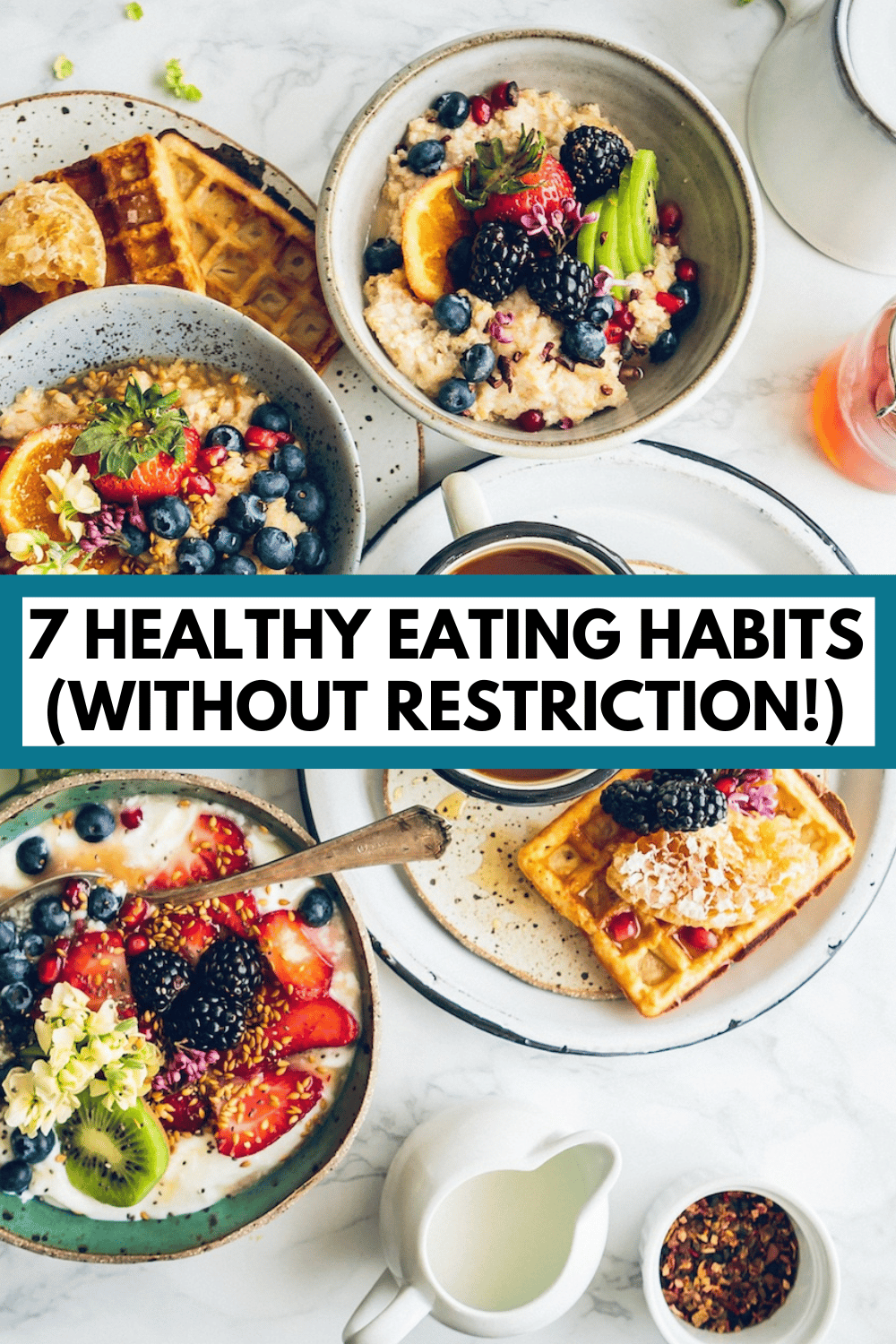
What Are Eating Habits?
Eating habits are “conscious, collective, and repetitive behaviors, which lead people to select, consume, and use certain foods or diets, in response to social and cultural influences.”
Your eating habits are usually pretty automated, with many influences. And understanding the influences on your eating habits can help you understand how to change your eating habits so they better align with your goals and intention for your life.
Influences On Your Eating Habits
Human eating habits can be very nuanced, with many influences. Some of the influences on your eating habits include:
- Finances
- Time
- Stress
- Sleep
- Access
- Education
- Culture
- Family
- Taste
- Medical history
- Medications
- Trauma
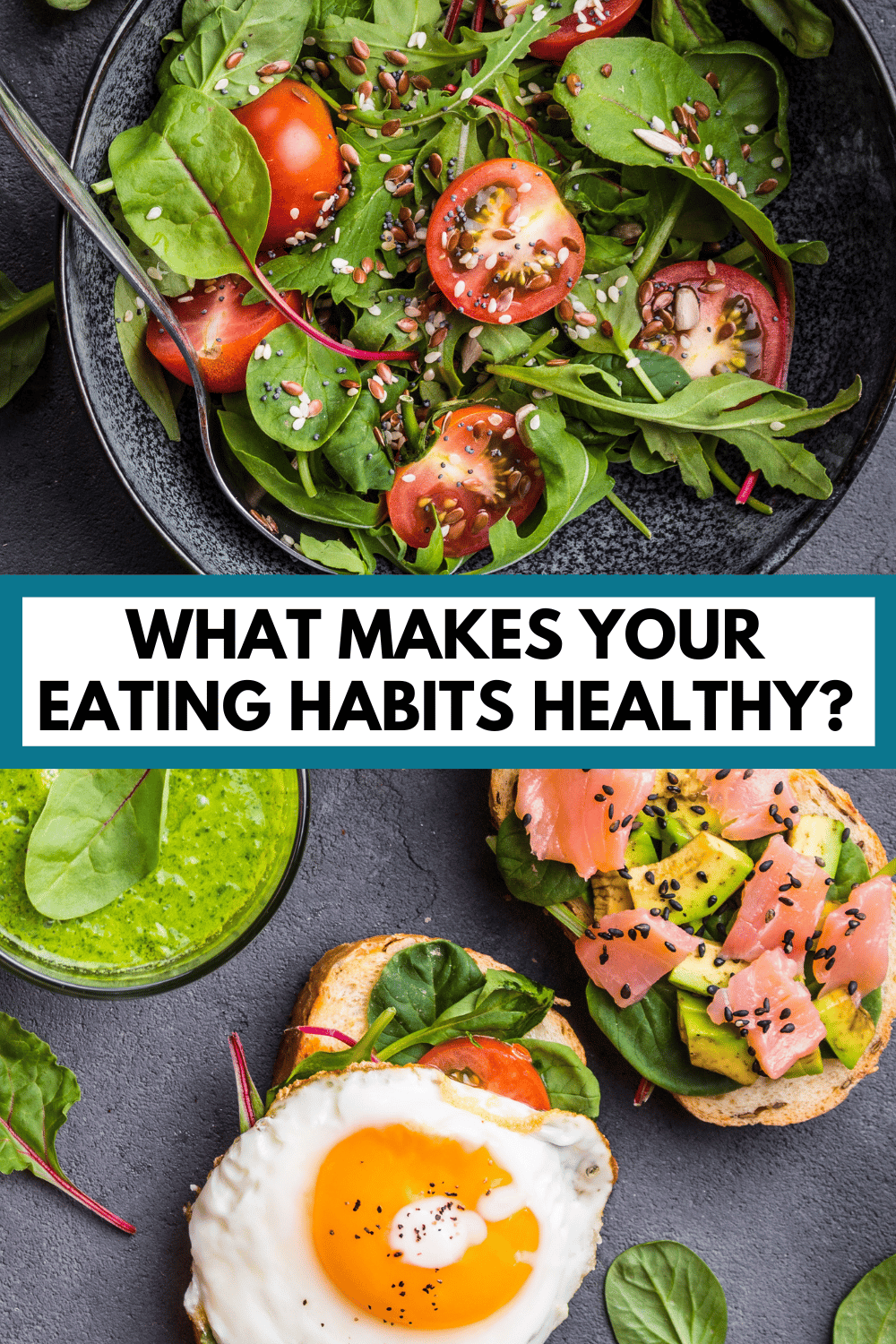
What Makes Eating Habits Healthy?
Off the bat, let’s make one thing clear – “healthy” is very subjective. What’s healthy for one person may not be for another. For example, a young college athlete living in the dorms is going to require different habits and nutrition to keep them feeling their best compared to a retired grandparent spending time in their garden.
But at the end of the day, there is one commonality when it comes to healthy eating habits.
Healthy eating habits are an eating pattern that helps you feel good physically, without feeling deprived or restricted mentally.
You need to find an individualized balance with habits that are realistic for you – including your budget, environment, access to food, cooking abilities, and more.
So How Can You Eat Without Restriction But Still Eat Healthy?
Balance. The key to eating in a way that nourishes your physical health without causing mental harm is balance. And that’s a moving target that looks different for each of us!
Eating without restriction doesn’t mean a free for all or eating without nutrient awareness.
It just means ditching the all-or-nothing mindset when it comes to food.
Eating without restriction means when it’s worth it to you, you know you can eat any food or drink and it won’t make or break your eating habits or health.
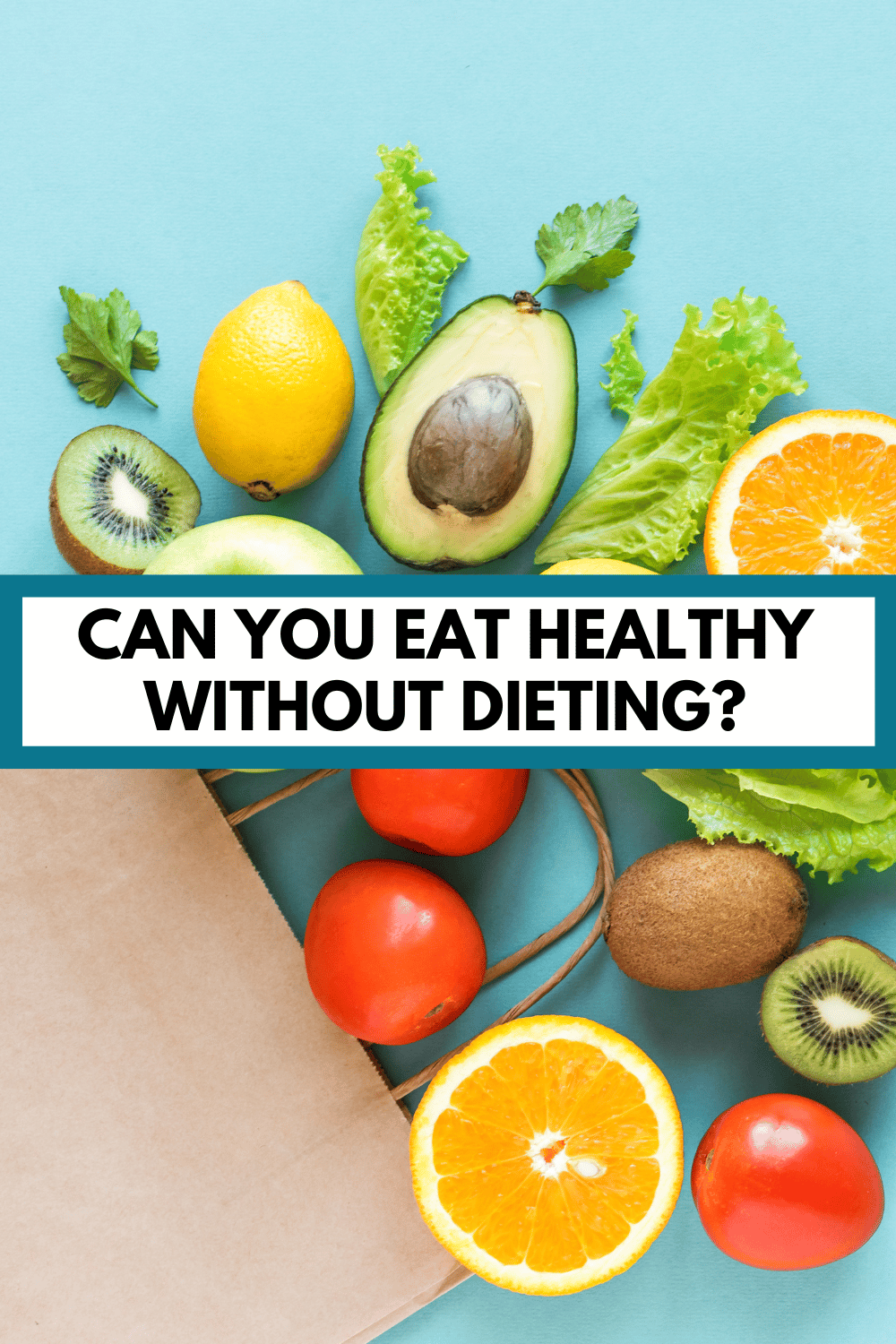
Benefits of Healthy Eating Habits
Focusing on creating healthy eating habits can come with many health benefits. Some such benefits, as noted from the CDC, include:
- You may live longer
- Healthier skin, teeth, and eyes
- Support muscles
- Improved immunity
- Strengthened bones
- Reduced risk of heart disease, type 2 diabetes, and some cancers
- Supports healthy pregnancies and breastfeeding
- Improves digestion and gastrointestinal function
- Promotes weight management
7 Healthy Eating Habits (Without Restriction)
Without further, let’s take an evidence-based look at 7 healthy eating habits (without restriction!) that this dietitian recommends prioritizing.
1. Eat Your Fruits & Veggies
While the research is limited, the CDC has released a report that says only 12.3% of Americans meet the recommended intake for fruit and just 10% for vegetables.
What’s the recommended fruit and veggie intake?
It varies based on age but generally the USDA recommends 2-3 cups of vegetables a day for women (3-4 cups for men) and 1.5-2 cups of fruits a day for women (2-2.5 cups for men).
The World Health Organization and Food and Agriculture of the United Nation reports are pretty on par, recommending 5 servings of fruits and vegetables a day. The American Heart Association recommends 4 servings of fruit (about 2 cups) and 5 servings of vegetables (about 2.5-3 cups) a day.
This does not mean you have to become a vegetarian or vegan if you don’t want to. You can still reap a significant number of benefits by including more plants in your diet.
2. Focus on Fiber
Fiber comes with tremendous health benefits, and with an estimated 95% of American adults and children not consuming enough fiber, meeting fiber needs is an important goal.
Fiber is an undigestible carbohydrate in plants associated with a variety of health benefits, like a decreased risk of heart disease, digestive disorders, some cancers, type 2 diabetes, and obesity.
The USDA Dietary Guidelines for Americans recommendation is about 14 grams of fiber for every 1000 calories consumed. The general recommendation is 25 grams a day for women and 38 grams a day for men.
If you want to focus on fiber goals with your eating habits, start by taking a look at your current fiber intake and food habits.
Then make a fiber-related goal that feels realistic to you. Some ideas:
- Add a serving of legumes to your day.
- Eat at least five servings of fruits and vegetables each day.
- Include a fruit, vegetable, or whole grain with a snack.
- Swap some refined grains for higher fiber whole grains instead.
- Include high-fiber avocado as a healthy fat source.
Check out this list of high fiber foods to get ideas of how to dial up the fiber in your own diet!
Oh, and one more important fiber note! While there’s not really such a thing as eating too much fiber, it is possible to experience some unpleasant gastrointestinal side effects if you eat too much too quickly. Gradually increase the amount of fiber you consume and you’ll be good to go.
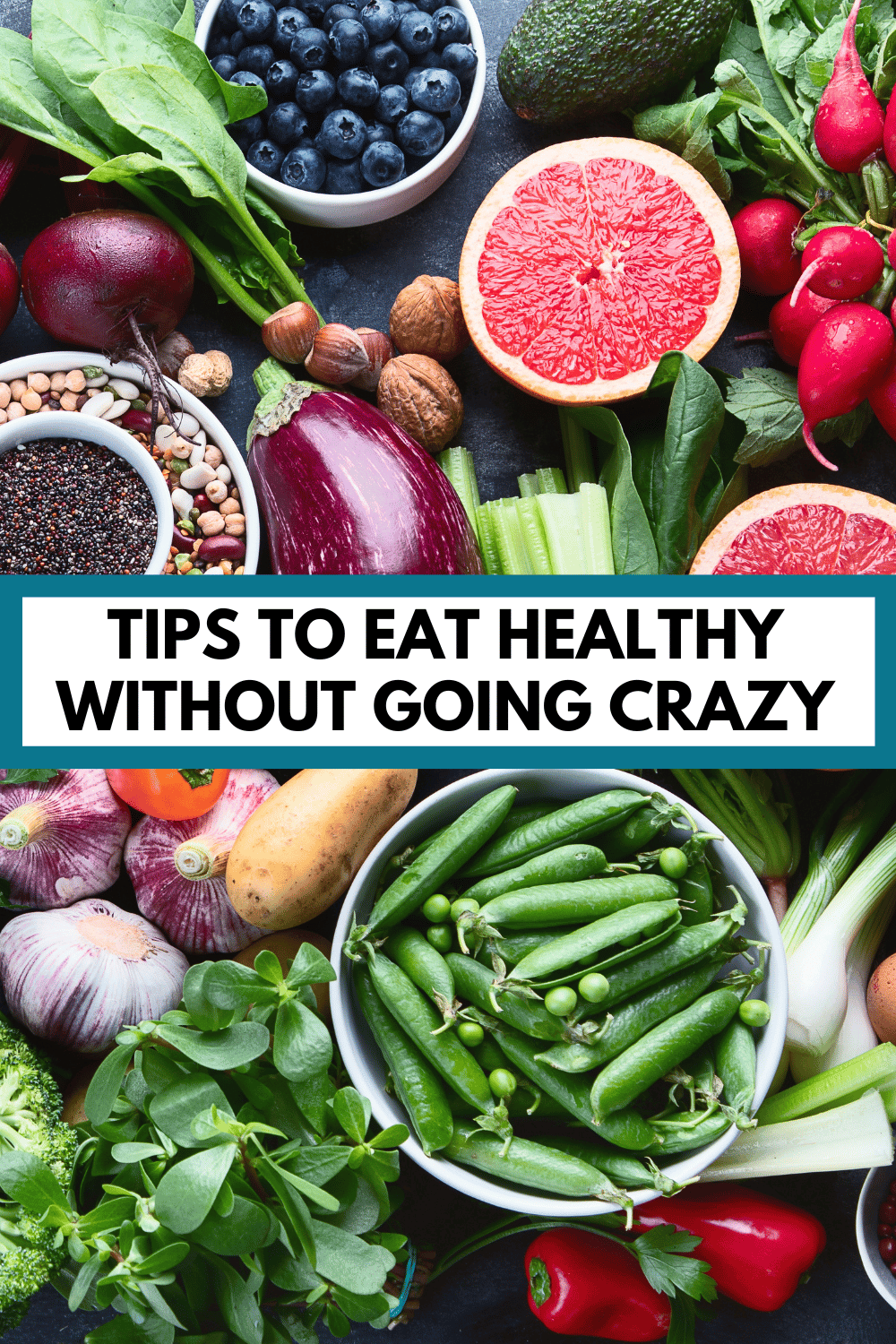
3. Prioritize Protein
You don’t need to go overboard with protein (and plant proteins count!), but not eating enough protein (especially earlier in the day) is a common pitfall I see with clients as a dietitian.
The Recommended Dietary Allowance (RDA) for protein is just 0.8 grams of protein per kilogram of body weight – but note that this is the minimum to simply exist. Many folks, especially those with fat loss and/ or muscle gain goals find more protein helps.
Protein foods include:
- Meat
- Poultry (chicken, turkey)
- Fish, seafood, shellfish
- Dairy (milk, yogurt, cottage cheese, cheese)
- Soy (soy milk, tofu, tempeh, edamame)
- Legumes (beans, lentils)
- Small amounts in nuts & seeds
- Also small amounts in whole grains
- Protein powders, shakes, bars (whey and plant-based)
Two general strategies you could try to increase the amount of protein at your meals are to:
- Include at least 20-30 grams of protein per meal.
- Dedicate 1/4 of your plate at a meal to protein.
4. Hydrate Well
Staying adequately hydrated is one major player in feeling good in your body!
Benefits of proper hydration include:
- Reduced risk of dehydration and kidney stones.
- Prevention of poor cognitive performance.
- Potential help with weight loss and fat loss, partially due to possible appetite suppressant effects.
- Prevent constipation (and associated feelings of bloat) in folks with dehydration — especially in those who also consume a low fiber diet.
Water is an essential nutrient, with the Institute of Medicine recommending a total water intake (from food and liquid) of 3.7 liters (125 ounces) for men and 2.7 liters (91 ounces) for women.
One of the best ways to ensure you’re hydrated? Check out the color of your urine. There’s a spectrum of hydrated yellows, but lemonade is an example of well hydrated urine.
5. Have a Food Plan
Having a food plan can be such an asset to both your health and your budget. And the best part? It doesn’t have to mean spending hours in the kitchen every weekend meal prepping every meal for the week ahead.
Sure, you can do that if you want to, but if you don’t want to or it’s not a realistic option for your lifestyle, that’s okay.
Having a food plan can be as simple or as involved as you’d like. Some ideas include:
- Knowing some quick, healthy snacks you can stash in your desk at work or grab-and-go from a convenience store.
- Buying no to low prep easy proteins, like rotisserie chickens, frozen grilled chicken strips, frozen edamame, nitrate-free oven roasted deli turkey, and Greek yogurts, for busy weeks with minimum time for cooking.
- Prepping overnight oats for the week ahead.
- Ordering groceries, like with a local grocery store pick up or Thrive Market (affiliate link that gives you 40% off your first order!), with a balance of food options that help you feel good.
- Cleaning and chopping all your vegetables when you get home from the market – or buying convenient options like pre-chopped vegetables, steam-in-a-bag frozen veggies, and salad kits.
- Stocking healthy pantry staples like oats, canned beans, canned tuna, whole grain pasta (again, Thrive Market can be a convenient way to do this!).
- Making freezer meals that you can quickly throw in your Instant Pot or slow cooker on busy days.
6. Listen to Your Body
Your body works hard to send you messages about what it needs! It can take a lot of practice, but start to listen to the hunger and fullness cues your body is sending you (like maybe you get irritable or have a hard time focusing when hungry).
Take a moment before eating and get intentional with why you want to eat and how you can best nourish your body.
Start practicing mindful eating (this article on mindful snacking is a good place to start!)
7. Zoom Out – Don’t Stress Every Micro Food Choice
Balance and moderation is the name of the game. I know “all things in moderation” is a bit of a trope, but it works. And if you’ve tried dozens of diets before and always find yourself falling off the wagon (hello diet cycle!), balance and moderation may be just the thing that’s missing.
You want to eat in a way that you can sustain for life – and enjoying food and food experiences is a part of that.
Plus, research shows us it’s the overall pattern of how you eat that’s the biggest impact on your health – not each and every individual food choice.

7 Healthy Eating Habits Final Thoughts
Whether this list has left you inspired to add more plants, fiber, and protein to your days, or eat more mindfully, or reminded you to not sweat the small stuff with your food choices, I hope you’re walking away feeling more empowered and ready to take action with your eating habits!
Hopefully this list of 7 healthy eating habits leaves you inspired for ways you can add some nutrition and health to your habits in a way that’s realistic for you – without ever having to feel restricted or deprived.



